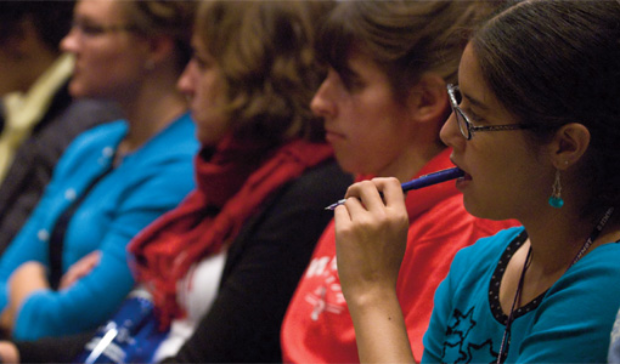Michael Novak, theologian, author, former U.S. ambassador, and holder of the George Frederick Jewett Chair in Religion, Philosophy, and Public Policy at the American Enterprise Institute in Washington, D.C., delivered a speech at the University of St. Thomas on October 29. The talk was the 17th Annual Stakeholder Dialogue sponsored by the Koch Chairs in Business Ethics and Catholic Studies.
Novak opened his lecture by noting that business is the most common vocation in the United States. Unfortunately, however, business people often have been characterized in unflattering terms. While there tends to be warm admiration for those who are, for example, farmers, fishermen, artists and the like, businesspeople are often viewed as self-interested maximizers who hoard their wealth rather than share it. Despite the treatment business usually receives from Hollywood, the news media, countercultural intellectuals and, at times, even the Church, the choice of a business career fits very well into what religious believers recognize as a calling from God that is unique to each individual.
Novak explained that one of the principal dimensions of the vocation of business is to lift people out of poverty. Business plays a critical role not only in creating wealth but also in distributing wealth. Throughout much of history, war and sickness have impoverished people while businessand market-oriented societies have created employment and abundance, thus raising people out of destitution.
The role of business is, therefore, of critical importance for a good society. But there is still much to accomplish in striving for the ideal. Novak noted that currently over two billion people are living on less than $2 a day. The critical task of the entrepreneur in society is to be the visionary, the spark, the connector. He or she must be able to see a need that is not being met and evolve a plan that creates jobs for the unemployed and provides realistic solutions for existing social problems.
The cultivation of the virtues is a critical dimension of the vocation of the entrepreneur. Too often, economists and intellectuals have taken for granted the moral capital necessary for a vibrant market economy and its various businesses to flourish. Virtue lies at the heart of this moral capital. Novak explained that business has a vested interest in virtue. It cannot go forward without realism, courage, wisdom, perseverance and integrity, or without a highly motivated and virtuous work community. It cannot endure without leaders and colleagues in whom many key virtues are internalized. In this and in many other ways, business is dependent on the moral and cultural institutions of a free society and on, for example, families, schools and churches. Businessmen and businesswomen need to be attentive to the nation's moral environment if the business economy and self-government are to survive.
Novak ended his talk by commenting upon the current financial crisis. He stated that the situation is not a crisis as much as a correction and added that the people who are predicting the end of capitalism will, as in the past, be proven wrong. He explained that our economic system, like any system, can become excessive and disordered and that the situation needs periodic correction. He noted that U.S. consumption is down 30 percent and that this is not bad in a country which routinely consumes too much and spends beyond its means. History has shown that a period of pruning and purifying is necessary for any system.
Novak’s talk was followed by respondents Thomas Holloran and Christopher DuFresne. Holloran, senior distinguished fellow at the University of St. Thomas School of Law and former president of Medtronic and CEO of Dain-Rauscher, spoke of his own vocation as a business leader. He emphasized the importance of business not in terms of its goal of shareholder wealth maximization but rather of its more important purpose to enhance the common good through serving the needs of society.
DuFresne, a senior business process manager at Target.com and a graduate of UST’s Catholic Studies and MBA programs, discussed his calling to the vocation of business in terms of his drive and desire to create great things. Yet any good creation, DuFresne argued, needs to have a solid moral foundation or else it will crumble. He pointed out that creators of wealth need such a foundation so that they don’t become subject to greed and pride. Young businesspeople must have a clear understanding of virtue, especially the cardinal virtues of justice, wisdom, temperance and courage.
The evening’s event was moderated by Jeanne Buckeye, a faculty member of the Opus College of Business and fellow of the John A. Ryan Institute for Catholic Social Thought.







